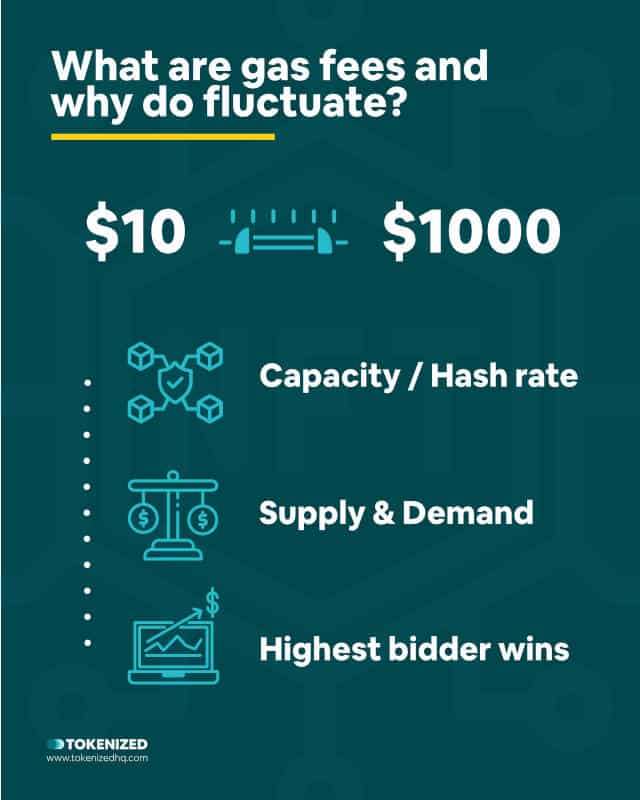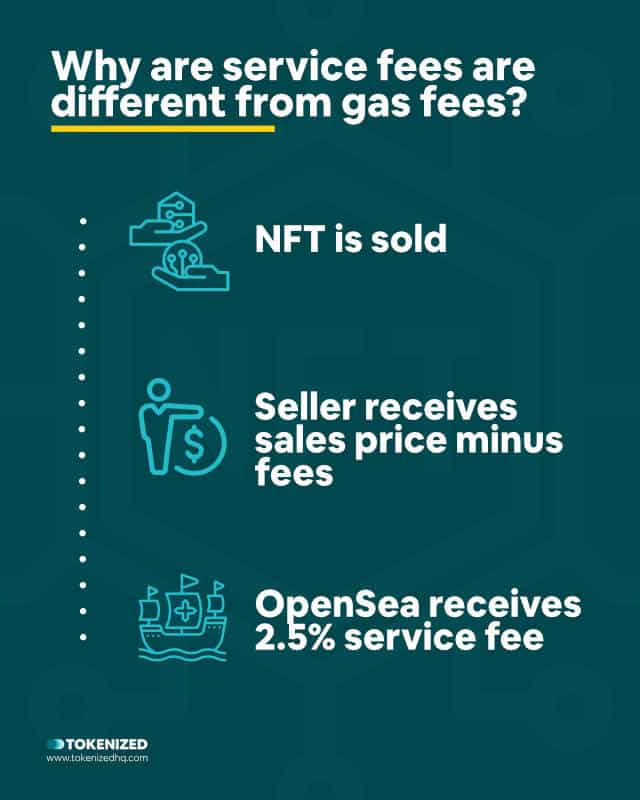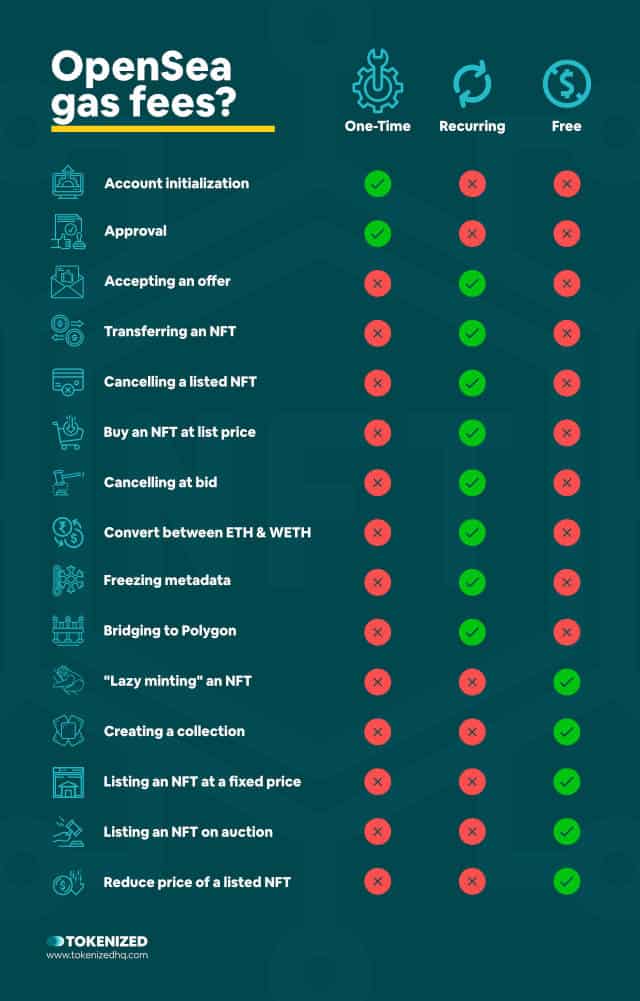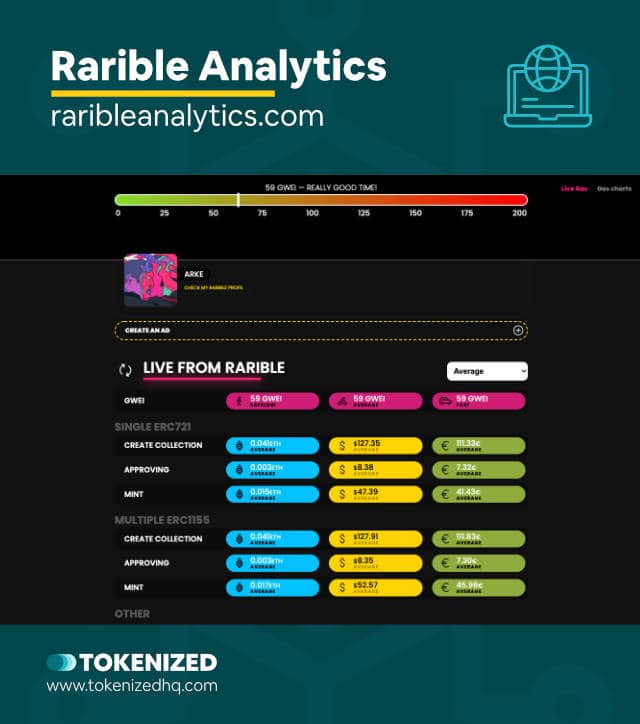Looking for a reliable source on OpenSea gas fees?
Or perhaps you just want to know what actions on OpenSea will cost you gas and which ones are gas-free?
Gas is a confusing concept for anyone who is new to NFTs and cryptocurrency in general.
That’s why we’re trying to shed some light on the differences between regular service fees and Ethereum gas fees.
In this guide, we’ll explain the difference, show you what actions on OpenSea will cost you gas and how you can find out how much gas costs right now.
Time to start learning.
Key Points (tl;dr)
- Gas fees are necessary in order to pay the miners who secure the Ethereum blockchain.
- OpenSea gas fees are actually paid to miners, while service fees are the commission of the OpenSea marketplace.
- OpenSea gas fees exist for various different actions, including listing, buying and selling NFTs.
- The price of gas will fluctuate with supply and demand on the Ethereum blockchain, however there is no such thing as a specific OpenSea gas price.
Like this content? Then share it!
Explained: OpenSea Gas Fees
www.tokenizedhq.com
Here’s the answer. Great article by @ChrisHeidorn right here: https://tokenizedhq.com/opensea-gas-fee/
What Are Gas Fees?
Gas fees on the Ethereum blockchain are the fees that users pay to miners for securing the blockchain. One can think of it as paying for processing power. And the price of this processing power (the hash rate) is a function of constantly changing levels of supply and demand.

Whenever you want to do something on a blockchain that uses a proof-of-work consensus mechanism, you need to pay fees for the transaction.
This is necessary because proof-of-work blockchains are secured by “miners” who mine each new block.
You can literally think of it as the fuel you put into your car.
Depending on what you want to do and how far you want to go, you’ll have to use a certain amount of gas.
However, the price of gas changes all the time because supply and demand change as well.
The only difference is that you’re not paying for mobility, but rather for processing power on the blockchain.
Gas fees may go down once Ethereum switches to a proof-of-stake consensus, but nobody knows for sure right now.
What Is the Difference Between Service Fees and OpenSea Gas Fees?
Service fees are essentially the commission that OpenSea takes on every successful purchase and they currently charge 2.5%. Gas fees are mostly outside of OpenSea’s influence and simply the fees that users must pay to Ethereum miners in order for their transactions to be processed.

Gas fees are different from service fees because they aren’t paid to OpenSea.
As we explained in the part of this article, gas fees don’t go into the pocket of OpenSea but rather end up with the Ethereum miners.
OpenSea can try to keep these fees to a minimum by optimizing their smart contracts, however, that’s just about all they can do.
On the other hand, service fees are the actual cut that they take from each successful purchase and OpenSea, the largest NFT marketplace, charges 2.5% per transaction.
If you’d like to get a better overview of all OpenSea fees, we have a very helpful article on this topic right here on Tokenized.
Does OpenSea Have Gas Fees?
Yes, OpenSea gas fees exist for various different actions which require interacting with the Ethereum blockchain. This is no different from other decentralized applications (DApps) and is always dependent on your usage of the blockchain.
Just like any other decentralized application (DApp), using OpenSea gas fees will always be necessary for some shape or form.
Creating, listing, buying and selling NFTs requires a lot of interaction with OpenSea’s smart contracts, which will only be processed if the user pays the necessary gas fees.
Not all actions on OpenSea necessarily cost gas and it may change depending on whether you are the one initiating the final sale or not.
Some NFT marketplaces allow gas-free minting (“lazy minting”) while others do not.
Ultimately it boils down to each platform’s respective strategy.
What Actions Cost Gas Fees on OpenSea?
OpenSea has one-time fees as well as recurring fees. From initializing your wallet to listing an NFT for sale, you can reasonably expect almost all actions to require gas if they require approvals or may change the state of the blockchain.

OpenSea gas fees come in 2 different categories: One-time fees and recurring fees.
One-time fees are incurred whenever you initialize a wallet for the first time or when you list your first NFT from a particular collection.
Recurring fees are incurred on various actions, such as:
- Accepting an offer
- Transferring an NFT
- Canceling a listed NFT (learn how to delist on OpenSea)
- Buying an NFT at the list price
- Canceling a bid
- Converting between ETH & WETH (check out our guide on OpenSea WETH for more details)
- Freezing metadata
- Bridging to Polygon
Speaking of bridging, there’s a very common Unlock Currency OpenSea error, that is relatively easy to fix if you know how to.
Bear in mind that this structure of the fees listed above might look different on other NFT websites.
For a more detailed overview of all OpenSea fees, please read our article “OpenSea Fees: Everything You Need to Know”.
Thankfully, not all actions on OpenSea necessarily cost gas.
Simple stuff like updating your profile or changing the OpenSea banner size usually requires you to sign with your OpenSea wallet, but won’t cost any gas.
How High OpenSea Gas Fees?
OpenSea gas fees can change at any given time and always depend on the current supply and demand of hash rate on the Ethereum blockchain. A good place to get a fair estimate of the gas fees to expect on OpenSea is Rarible Analytics, which provides 24h live data for various actions on the Rarible marketplace.

Ethereum gas fees are in a constant state of flux due to the supply and demand for blocks.
There is no way to predict exactly how much a certain transaction might cost in the future.
In peak times a simple transaction can cost upwards of $300 or even much more, while in times of low demand, it might just cost a “modest” $40 or less.
The best way to check the current price of gas is to have a look at one of the many Ethereum or OpenSea gas fee trackers.
Or, for a reasonably close estimate of what specific actions might cost on OpenSea right now, you can also refer to Rarible Analytics.
While the data is obviously specific to Rarible gas fees, it does give a good indication as to the level of gas fees to expect on OpenSea as well.
Conclusion
The meteoric rise of NFTs has clearly left its mark in the cryptocurrency space.
With transaction fees surging to new all-time highs on the popular Ethereum network, it’s become obvious to everyone that gas fees are a major problem.
Everyone is constantly checking the current gas price to figure out whether it’s a good time to transact or not.
Never before has it been so important to fully understand what costs gas and how you can optimize your costs.
Here at Tokenized, we want to help you learn as much as possible about the coming NFT revolution. We help you navigate this fascinating new world of non-fungible tokens and show you how you can integrate tokenization into your own business.



